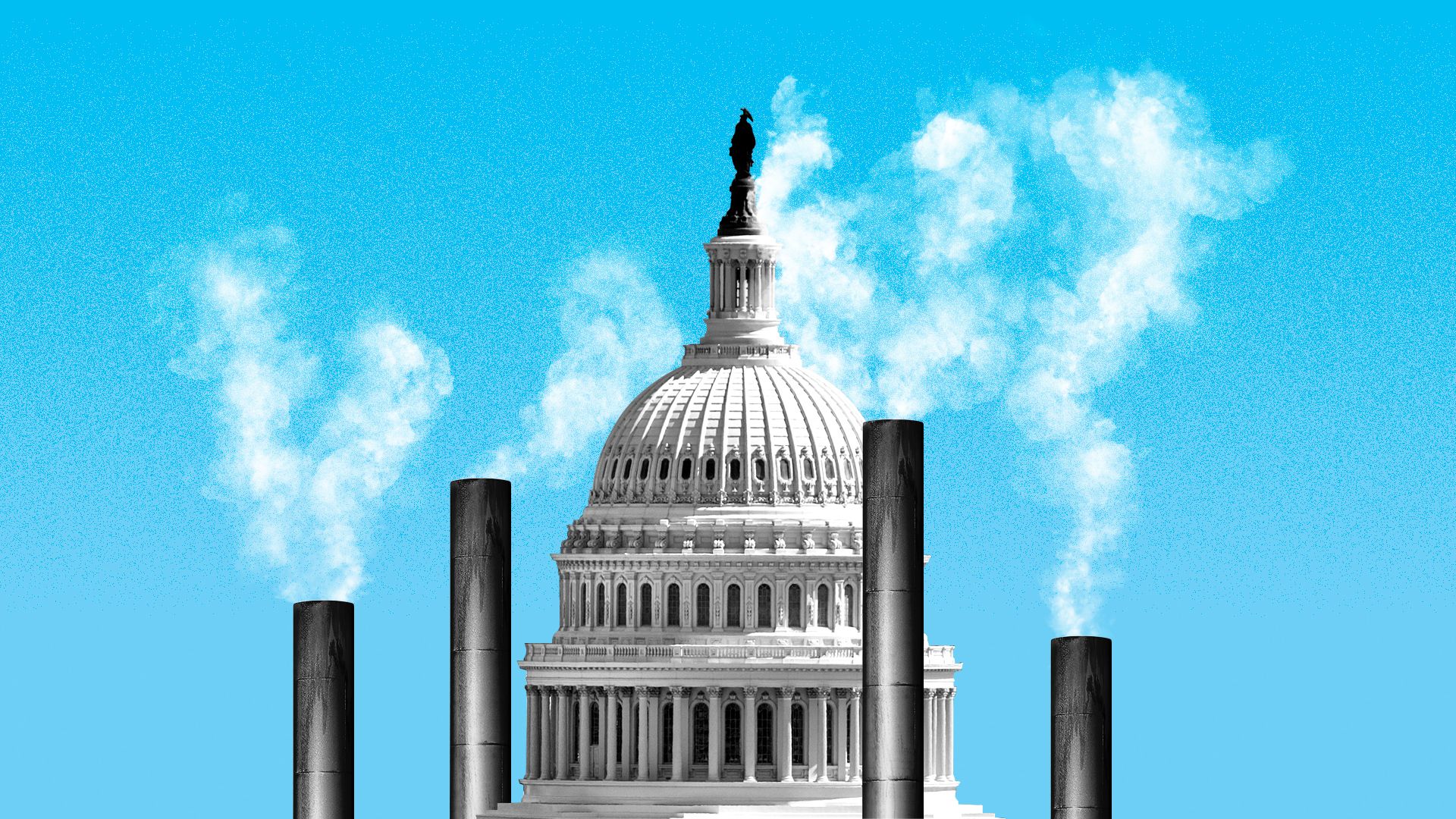As Congress talks climate policy, carbon price gets no love
Add Axios as your preferred source to
see more of our stories on Google.

Illustration: Aïda Amer/Axios
New lobbying urging Congress to support a price on carbon emissions is not convincing lawmakers to warm up to the policy.
Why it matters: A carbon price is widely considered one of the most economically efficient ways to tackle climate change. But, economics be damned, its politics remain deeply unpopular.
Where it stands: Despite renewed agreement that climate change is a problem the government should address, Democrats and Republicans are talking past each other on policy. That’s troubling for those who want action, because bipartisan support is almost always essential for big legislation.
- House Democrats recently introduced legislation that relies on mandates that could put an indirect — and thus less efficient — price on CO2. “We don’t have an explicit carbon price because we don’t think we need it,” House Energy and Commerce Chairman Frank Pallone said recently.
- After a decade of mostly dismissing climate change, Republicans have begun to engage on policies, but House GOP leadership is pushing far narrower policies.
- Discarded in that shuffle is what economists, business executives and most energy experts agree is the most necessary (if not solely sufficient) tool to tackle climate change: putting a direct price on the climate impact of oil, natural gas and coal through a tax on the carbon dioxide they emit.
This dismissal is occurring despite a growing list of deep-pocketed and influential interests saying they want Congress to pass precisely that policy.
- The Climate Leadership Council, a coalition founded three years ago, and a related lobbying effort launched in 2018 are pushing a carbon price whose funds go back to Americans via dividend checks. Numerous corporations, including big oil companies, are supportive, as are former top Republican leaders and environmental groups.
- The CEO Climate Dialogue, which launched last spring, is a similarly broad-based coalition pushing a campaign for a less prescriptive carbon price.
Yes, but: It’s still early days for these efforts. Lobbying behind the scenes could produce a sea change not publicly evident today, either imminently or years down the line.
- “We think it’s likely our plan will be introduced in both chambers on a bipartisan basis by mid-year,” said Ted Halstead, CEO of the Climate Leadership Council.
Flashback: Similar legislation has already been introduced in the House, and that by itself does not indicate enough members from both parties will back it. Past precedent is also unfavorable to the policy.
- In the span of six months in 1993, Bill Clinton proposed — and then largely retracted — what amounted to the closest thing to a carbon tax a U.S. president has pursued.
- Neither Barack Obama nor 2016’s Democratic presidential nominee, Hillary Clinton, embraced a carbon tax.
- A core problem is that it’s regressive — the tax disproportionately affects low-income people — though current proposals attempt to counteract that, like the dividend which helps poorer families the most.
The intrigue: The subtle evolution of one moderate House Republican — Rep. Tom Reed of New York — illustrates today’s persistently cool reception.
- When I interviewed him last summer, he said flat out he “doesn’t support a carbon tax” but that a carbon dividend is “more intriguing” to him.
- Fast forward to last month. He told me he has become less optimistic about its prospects and his potential support for it because of long-standing concerns about the money not actually ending up back in Americans’ pockets.
- “There are stakeholders who are quietly saying that they love this idea, they would get it into law and then they have a strategy to kill the dividend and put it into the general coffers,” Reed said. “People are salivating to get access to that revenue, and that carries a lot of sway with me.”
- What to do with the money raised is a perennial debate.
A more fundamental dynamic is at play with Republicans.
- Backers of a carbon price argue that such a policy is inevitable. They believe it’s just a matter of time until at least a few Republicans embrace it, and most Democrats accept it despite wanting something more aggressive, and enough lawmakers get it over the finish line.
- That scenario ignores one possibility: that Republicans don’t ever embrace it and instead indefinitely push their renewed focus on innovation, which was also the climate agenda of America’s last Republican president, George W. Bush.
“There is a risk that the innovation agenda is inadequate to address climate change but adequate to address the political pressure on Republicans. That is a risk today. But the forecast for the impacts of climate change is so severe I believe that pressure to address the reality of the situation will make the current proposals clearly insufficient in time.”— Alex Flint, executive director, Alliance for Market Solutions
What’s next: Expect more support to emerge off of Capitol Hill soon. Halstead says his group is announcing new members this month.
The bottom line: On the Hill, a carbon price appears to be on the path it has always been on — a road to nowhere.
